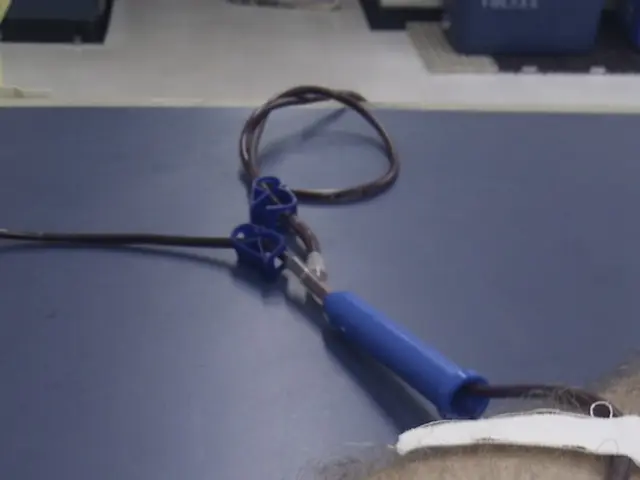Hormone Imbalance, Anxiety, and Depression's Complex Relationship: Exploring the Underlying Bond
Hearing the symphony of hormones within our bods isn't just about physical health - it's a critical part of our mental well-being too. While we might be familiar with the physical impact of hormones, their influence on our mental state is often overlooked. The link between hormone imbalance, anxiety, and depression is a thrilling, complex area of research that's been gaining attention recently.
Understanding Hormone Imbalance
Hormone imbalance happens when there's too much or too little of a hormone in our bloodstream. Produced by various glands in our endocrine system, these chemical messengers control vital functions, like metabolism, growth, and mood.
Stress, diet, certain medications, environmental toxins, and medical conditions affecting the endocrine glands are common culprits behind hormone imbalance. Symptoms like fatigue, weight changes, mood swings, and sleep disturbances, though general, can significantly impact our quality of life and mental health.
Some essential hormones with a strong influence on mental health include:
- Cortisol - dubbed the "stress hormone," its role is crucial in our stress response.
- Thyroid hormones - they regulate our metabolism, affecting mood and energy levels.
- Estrogen and progesterone - these sex hormones have a significant impact on our mood and anxiety levels.
- Testosterone - while primarily linked to male characteristics, it also influences mood regulation for both sexes.
Tests like blood, saliva, or urine tests help diagnose hormone imbalances. However, hormone levels can fluctuate throughout the day, so multiple tests might be needed for accurate diagnosis.
The Relationship Between Hormones and Anxiety
The link between hormones and anxiety is intricate, with hormones influencing neurotransmitters and brain function, potentially leading to or intensifying anxiety symptoms. For example, high cortisol levels contribute to feelings of anxiety and restlessness.
Hormone-related anxiety can appear in various ways, and its symptoms might be different from those of general anxiety disorder. Individuals experiencing hormonal anxiety might notice their symptoms worsen at specific times of the month or in conjunction with other hormonal symptoms.
Research shows that certain hormonal imbalances are associated with anxiety:
- High cortisol levels: Chronic stress can cause persistently elevated cortisol, contributing to anxiety and other mood disorders.
- Low progesterone: Progesterone has a calming effect on the brain, and low levels are linked to increased anxiety, particularly in women.
- Thyroid imbalances: Both hyperthyroidism and hypothyroidism can lead to anxiety symptoms.
Treatment for hormone-induced anxiety might include lifestyle changes, medication, or hormone replacement therapy (HRT), emphasizing the growing recognition of the connection between hormonal health and mental well-being.
Hormonal Imbalance and Depression: Unraveling the Connection
Just as hormones affect anxiety, they also play a significant role in mood regulation and can contribute to depression. Several hormones hold importance in this context:
- Serotonin - the "happy hormone" affects our mood and is influenced by various hormones.
- Dopamine - a neurotransmitter involved in pleasure and reward systems, can be affected by hormonal changes.
- Thyroid hormones - both hyperthyroidism and hypothyroidism have ties to depressive symptoms.
- Sex hormones - estrogen, progesterone, and testosterone all impact mood regulation differently.
Hormonal fluctuations can trigger or exacerbate depressive symptoms in various ways. Conditions like postpartum depression, premenstrual dysphoric disorder (PMDD), and perimenopause/menopause highlight the connection between depression and hormonal imbalance.It's noteworthy that the relationship between depression and hormone imbalance is reciprocal - depression can also affect hormone levels. For instance, depression can cause low testosterone levels in men, resulting in a challenging cycle to break.
Diagnosing Hormone-Related Anxiety and Depression
Diagnosing hormone-related mental health issues calls for a comprehensive approach, considering both psychological and physiological factors. A thorough diagnostic process typically involves:
- Comprehensive health assessment - a detailed medical history, physical exam, and symptom discussion.
- Hormone testing - blood, saliva, or urine tests to measure hormone levels.
- Mental health evaluation - a psychological assessment to determine the nature and severity of anxiety or depressive symptoms.
The challenge in diagnosing hormone-related mental health issues is distinguishing them from other causes. Expertise from mental health professionals and endocrinologists is essential for accurate diagnoses and effective treatment plans.
Treatment Options for Hormone-Induced Anxiety and Depression
Treatment for hormone-induced anxiety and depression often involves a holistic approach, covering both the hormonal imbalance and mental health symptoms. HRT is one potential treatment option for depression, but not suitable for everyone.
Lifestyle changes, such as a balanced diet, regular exercise, and stress management, can significantly support hormonal balance and mental health. Complementary therapies might also benefit some individuals, but consulting with a healthcare provider is crucial to avoid conflicts with medications or hormone levels.
Addressing both hormonal and psychological aspects is vital for effective treatment, possibly requiring a combination of hormone therapy, psychotherapy, and psychiatric medications.
The Role of Specific Hormones in Mental Health
Though we've touched on several hormones already, it's worth delving deeper into certain hormonal imbalances and their potential impact on mental health.
Estrogen dominance can have significant physical and mental effects, contributing to mood swings, anxiety, depression, and weight gain. Consequently, recognizing symptoms of estrogen dominance is essential.
Another hormone gaining attention is human chorionic gonadotropin (HCG), linked to anxiety in some individuals. The relationship between HCG and mental health is still evolving, underscoring the complex interplay between various hormones and mental health.
The pituitary gland, known as the "master gland" of the endocrine system, plays a crucial role in mental health too. Pituitary gland dysfunction can be linked to depression, highlighting the intricate connection between the endocrine system and mental well-being.
Conclusion
The connection between hormone imbalance, anxiety, and depression is fascinating and complex. By exploring this interplay, we gain a better understanding of the significance of considering both physical and mental health in diagnoses and treatments. This insight opens new avenues for treatments, potentially offering hope for individuals who haven't responded well to traditional mental health treatments.
Embracing a holistic approach to health, considering the intricate interactions between various bodily systems, is essential. As research in this field grows, we'll likely discover even more about the intricate dance between our hormones and mental health. Seeking professional help is crucial for those experiencing anxiety or depression, leading to more accurate diagnoses and effective treatment plans.
- Hormone imbalances, despite often being overlooked in discussions about mental health, can have significant effects on our mood and anxiety levels.
- Certain hormones like cortisol, thyroid hormones, estrogen, progesterone, and testosterone play crucial roles in regulating our mood and managing anxiety.
- Hormone imbalances can cause symptoms such as fatigue, weight changes, mood swings, and sleep disturbances, which can impact our quality of life and mental health.
- Treatment for hormone-induced anxiety might involve lifestyle changes, medication, or hormone replacement therapy, underscoring the growing recognition of the connection between hormonal health and mental well-being.
- Diagnosing hormone-related mental health issues requires a comprehensive approach, encompassing both psychological and physiological factors, including comprehensive health assessments, hormone testing, and mental health evaluations.
- Addressing both hormonal and psychological aspects is vital for effective treatment, possibly requiring a combination of hormone therapy, psychotherapy, and psychiatric medications.
- Specific hormonal imbalances, such as estrogen dominance, human chorionic gonadotropin (HCG), and pituitary gland dysfunction, can have significant impacts on mental health, calling for more research in this area to fully understand the intricate dance between our hormones and mental health.








